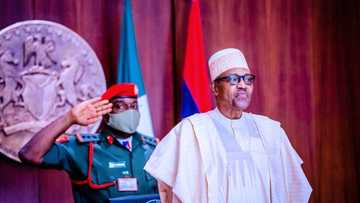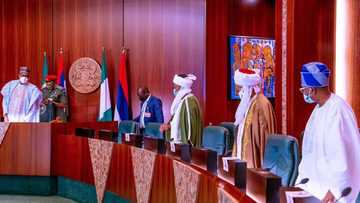OPINION: Buhari’s legacy and Osinbajo’s burden by Etim Etim
Editor's note: Public affairs commentator, Mr Etim Etim writes on the burden faced by Nigeria's vice president, Professor Yemi Osinbajo, following some of the gloomy legacies associated with the administration of President Muhammadu Buhari.
PAY ATTENTION: Join Legit.ng Telegram channel! Never miss important updates!
Whenever we have one of those episodic security crises like the Katsina school abductions, Lekki shootings, standoff in Ondo over forest reserves and the skirmishes in Igangan area of Oyo, I think of Yemi Osinbajo. How does he cope in a government that is facing mounting security challenges across the nation, yet seems incapable of handling them decisively? Is he not frustrated by the apparent reluctance or inability of the government to drastically halt the increasing cases of insecurity in the land? Is the VP not worried that the administration is increasingly being defined more by the activities of marauding herdsmen than its investments in social welfare, agriculture and infrastructure? What goes through the VP’s mind whenever the nation erupts in turmoil?
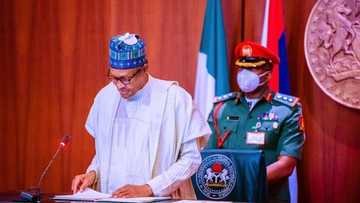
Read also
This is one thing president Buhari will never do to Nigeria media - Femi Adesina gives details
Professor Osinbajo has been undoubtedly loyal to the president and very competent in his duties. He contributes so much to the success of the administration in the economic front. It must therefore be quite agonizing for him that these gains are being diminished by the sometimes tacky approach of the government to the multifaceted security setbacks.
I presume that it is quite exasperating to the vice president that the legacy of this administration would be defined more by its mismanagement of our safety and accusations of nepotism than by the huge investments it has made in infrastructure and food production. It is a big burden, indeed, if you know what to do, but have no power to do it. That is the burden of Yemi Osinbajo, and it may end up as the legacy of this president.
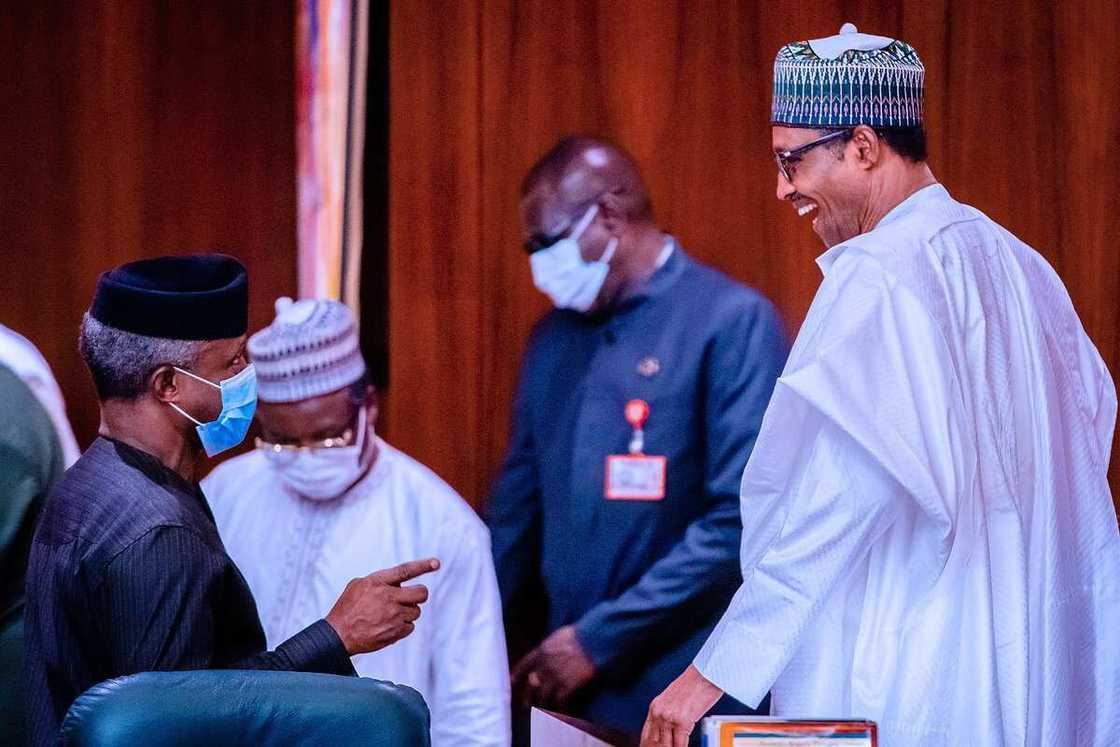
Source: Twitter
PAY ATTENTION: Install our latest app for Android, read best news on Nigeria’s #1 news app
Directed by President Buhari, the VP supervised the design and roll-out of the administration’s core economic agenda, Economic Sustainability Plan (ESP), last year, which essentially replaced the Economic Recovery and Growth Programme launched in 2017. The N2.3 trillion ESP is fashioned to respond robustly and appropriately to the challenges posed by the COVID-19 pandemic. Beyond the ESP, the government has attained many heights in other areas.
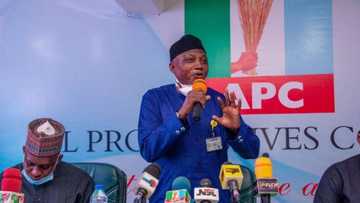
Read also
Presidency reveals Nigerians responsible for Transparency International’s ranking of Nigeria as 2nd most corrupt
In agriculture, it's over N500billion investments in rice production has created thousands of jobs, empowered two million farmers, saved foreign exchange and made the nation self-sufficient in the produce. Over 30 new rice mills have been built in the country since 2015, some of them funded with foreign exchange inflows. Farming has become such a beautiful bride that even construction giant, Julius Berger, is planning to create a separate subsidiary to focus on it.
In the area of infrastructure, the administration has built many major highways; some are still under construction or reconstruction; while new rail lines have been constructed and put to use. For the first time in the 108-year history of Apapa ports, a rail line has just been extended to the complex to facilitate haulage of goods. New airport terminal buildings have also been rebuilt or built anew by the administration. Fiscal prudence and discipline have replaced the profligacy of the past. No wonder the administration has done so much in these lean times.
But these accomplishments have largely been relegated to the background by daily reports of security crises and the appearance of a weak response from the government. The fact that the main terrorist group – Boko Haram and its affiliates - are no longer as audacious in their operations as they were a few years ago does not seem to blunt the growing stridency of critics. Although the terrorists have largely retreated into sleeper cells at the fringes of Lake Chad, the emergence of bandits and kidnap gangs virtually everywhere in the country has rolled back the initial gains of the military against the radical Islamist fundamentalists.
Nigerians are understandably agitated. The whole of northern Nigeria, peaceful and serene some decades ago, is now a vast wasteland, plundered and destroyed by gangs of young robbers and brigands called bandits. The southwestern part of the country, home to the over 30 million Yoruba people, is now under siege by kidnappers, who have moved in mostly from the northern parts of the country. These criminals have taken refuge in the many forest reserves in the expanse area stretching from Oyo to Edo states. From these forests, they launch ferocious attacks on the citizens; kidnapping, raping, killing and assaulting.
Yet, in the popular estimation, the federal government appears soft, tentative or at best indecisive in its response. There are even Nigerians who have come to the conclusion that the Buhari administration is deliberately covering up or condoning the atrocities of these criminals for some primordial reasons. That is implausible. But the statement issued by Garba Shehu on the standoff between Ekiti state government and the criminals hiding in the forests in the state did not in any way help in dispelling these insinuations. It rather added fillip to the rumours of official acquiescence. Could the president have signed off on that kind of statement? I doubt it, but I wonder how such things persist.
With a little over two years left to the end of his tenure, the president, if he is well advised, ought to be looking to set his agenda along the lines of fine-tuning his legacy. It is notable that the president has eventually replaced the service chiefs with a more diverse set. The applause across the nation is audible. The new generals should give further impetus to the war against terrorism and bring new ideas to the fight against crime. The nation now anxiously awaits the appointment of a new Inspector General of Police. It is important that the president also give due consideration to competence and diversity in this matter too. He should be well aware that most of the critical commentaries against his administration stem from the lopsided selection of the nation’s security chiefs from one section of the country. It deepened the suspicion that this president is insensitive to the plurality and diversity of our country.
Certainly, the buck stops on the president’s table and only he will bear the responsibility for the administration’s strides and shortcomings. I believe that given his keen understanding of issues, the vice president must have gone up to the president to express his reservations and offer his suggestions many times on how well to manage these crises. But it is the president that has the last word. This is what I refer to as the burden of Osinbajo.
Many Nigerian would imagine that the VP would have handled these crises differently if he had the power. I recall that when he was acting president in 2018, Osinbajo had fired the then DG of DSS, Lawal Daura, for his complicity in the security breaches at the National Assembly. He acted with alacrity, decisiveness and courage within the law to defend our democracy, to the admiration of the nation, in the same manner in which Mike Pence, vice president to Donald Trump, acted on January 6, 2020, to protect the American democracy.
In our presidential democracy, the president has enormous powers in discharging his executive functions. Ministers and all federal employees, including the police chief and heads of the armed forces, serve at his pleasure. Although the VP and president are elected on the same ticket, our constitution does not give separate executive functions to the VP. Apart from his chairmanship of National Economic Council which is spelt out in the constitution, every other duty the VP performs is a delegated authority from the president. In fact, with his enormous powers, the Nigerian president appears more or less like a democratic monarchy; and this explains why a VP cannot do much without the president’s blessings, no matter how brilliant his ideas may be.

Read also
Nigeria sitting on gunpowder - Yoruba leaders make demand from Buhari after Sunday Igboho saga
The president should be reminded that leaders are oftentimes known more for their failures than their good deeds. Americans remember Richard Nixon for Watergate; IBB is remembered more for the annulment of June 12 elections than for building Third Mainland Bridge; Obasanjo is better known for seeking third term than bringing GSM. Will Buhari be remembered more as a leader who was tolerant of the atrocities of cattle herders than the president who revived our railway? Well, this is actually the president’s burden.
Disclaimer: The views and opinions expressed here are those of the author and do not necessarily reflect the official policy or position of Legit.ng.
Your own opinion articles are welcome at info@corp.legit.ng— drop an email telling us what you want to write about and why. More details in Legit.ng’s step-by-step guide for guest contributors.
Contact us if you have any feedback, suggestions, complaints, or compliments. We are also available on Twitter.
Source: Legit.ng


